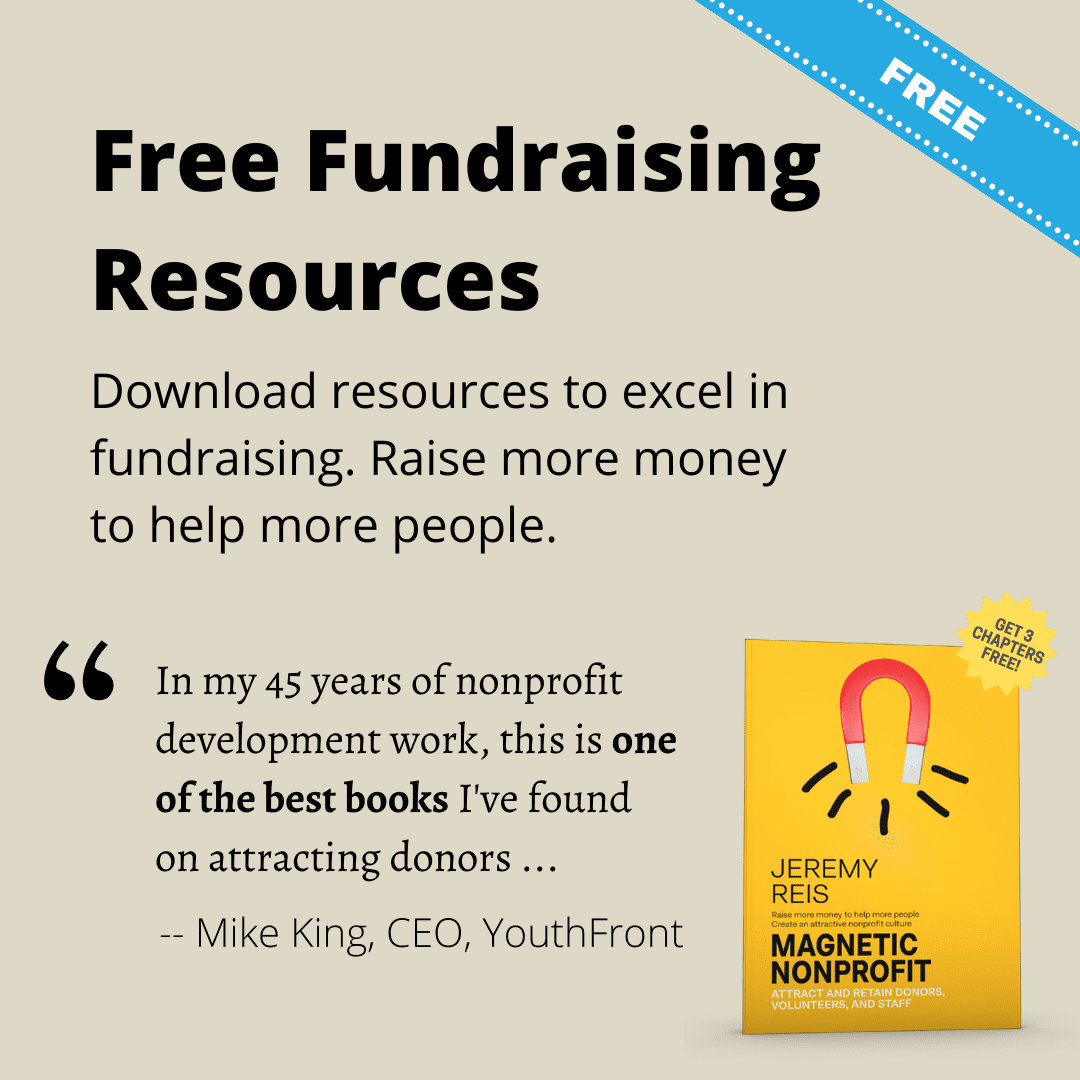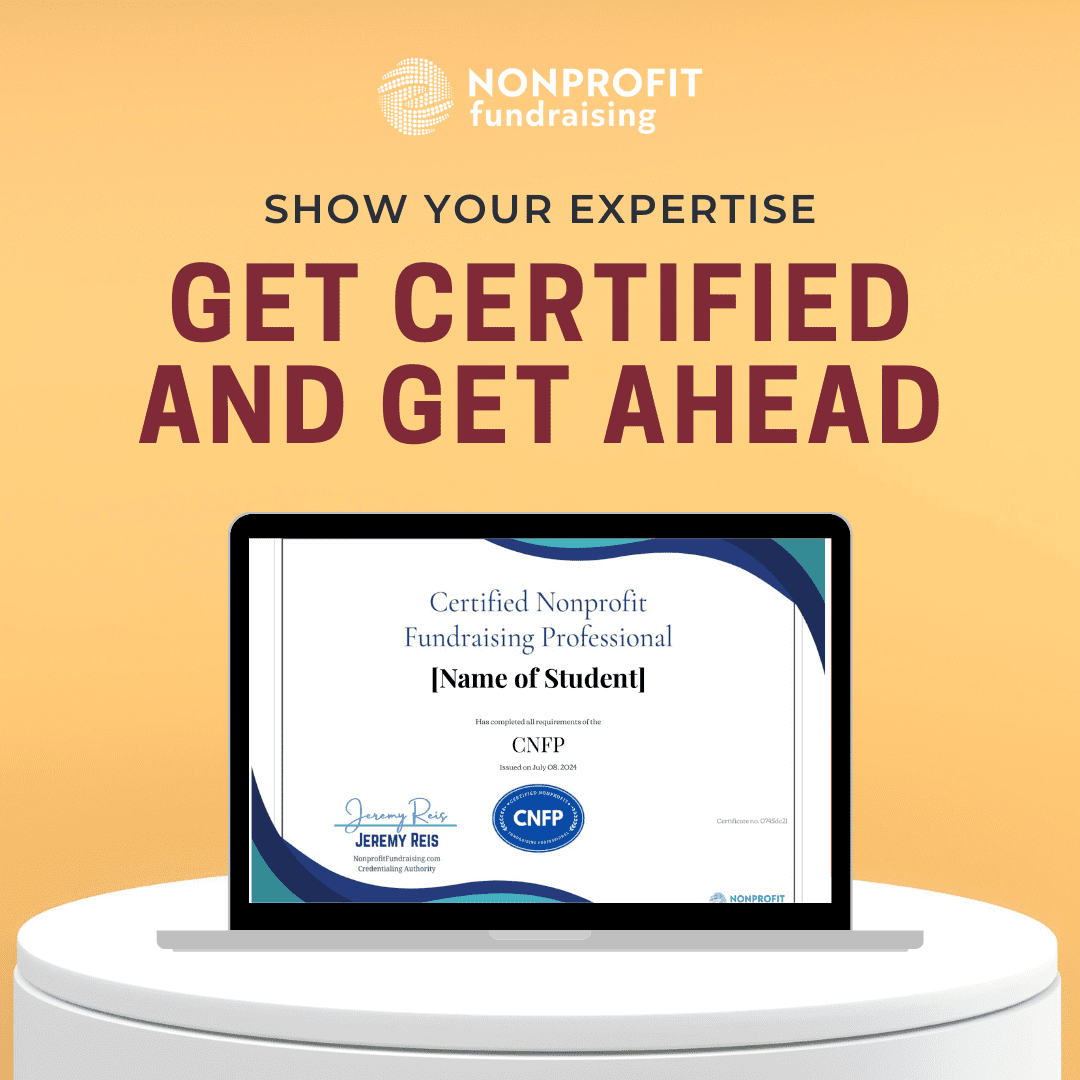In this episode of Nonprofit Answers, host Jeremy Reis explores the pros and cons of obtaining a nonprofit fundraising certification. As certifications in the nonprofit sector gain popularity, Jeremy breaks down the benefits, such as enhanced credibility, expanded knowledge, and valuable networking opportunities. He also addresses the potential downsides, including the cost, time commitment, and the gap between theory and real-world application.
Additionally, Jeremy introduces the new Certified Nonprofit Fundraising Professional (CNFP) certification, created by NonprofitFundraising.com. This certification is designed for fundraisers at all levels and covers five essential domains: Introduction to Fundraising, Donor Research and Data Management, Communication Skills, Fundraising Strategies, and Ethics and Professionalism. Priced at $199, the CNFP offers a practical and accessible way to advance your fundraising career without the drawbacks of other certifications.
Whether you’re considering a certification or looking to enhance your skills, this episode provides valuable insights to help you make an informed decision. Tune in to learn more about how the CNFP certification could be the right fit for your professional journey.
Full Generated Transcript:
Welcome to episode 46 of nonprofit answers, where we tackle the tough questions that come with working in and leading nonprofits with a special focus on fundraising. I’m your host, Jeremy Rice. And today we’re diving into a topic that many of you have likely pondered at some point in your careers. Should you get a nonprofit fundraising certification? Uh, my background, I come, uh, originally my career was in it. Uh, and then it certifications is both commonplace and expected. Uh, when you are in information technology, you are expected to, uh, get certifications to demonstrate your knowledge and expertise in certain technical areas.
So the question is, is, does fundraising need these kind of. Proofs that you know what you’re talking about. Fundraising certifications. They’ve become increasingly popular over the past few years, and many professionals seek to, uh, bolster their credentials and, uh, expand their knowledge base to both demonstrate to their. Current employer that they know what they’re talking about and potential new employers that they know they’re talking about. But like any significant career decision. There’s positives in there, negatives to consider before you take the plunge into certification.
So let’s talk about those first. Let’s talk about the benefits. One benefit is a credibility and professional recognition. One of the most compelling reasons to pursue a fundraiser certification is the credibility that can bring a certification like certified fundraising executive. Commonly known as the CFRE. Or the chartered advisor in philanthropy, the CAAP. These things, these certifications, it can set you apart in your field.
It signals to employers, to donors, to colleagues that you understand that you have a solid understanding. Of the principles and practices of fundraising. That recognition, it can open doors to new job opportunities to promotions and to potentially higher salaries for you. The second benefit is enhanced knowledge and skills. When you have to prepare for a certification exam, it, it requires, uh, a deep dive into various aspects of fundraising from donor acquisition to retention, to ethics, to legal considerations. And not only refreshes the knowledge you already have, but it also fills in gaps that might exist in your experience.
For example, when I was at food for the hungry, I didn’t have any experience with major or mid-level donors. And so when I moved over to Christa ministries, that was one of the areas of focus that I wanted to learn. And so I took the time to expand my knowledge, uh, by getting a case file going, uh, by, uh, working with donors hand-in-hand and understanding mid and major donors.
And what makes them. Different than your general donors. So you’re going to gain new strategies and you’re going to gain new techniques that you can immediately apply to your work. So this is a benefit not only, uh, to learning for the certification. But it’s a benefit to your workplace because you’re going to be able to apply these new things that you’re learning. To your job that you’re doing every single day. Oftentimes the certifications provide networking opportunities. Many certifications programs offer access to a community of like-minded professionals. So it could be through study groups or conferences, alumni networks. Being a part of a community can provide valuable networking opportunities.
You’re going to meet peers who are going through similar challenges and these connections can lead to collaboration. Mentorship. And new career opportunities. And finally a benefit is personal satisfaction and confidence. There’s a personal satisfaction. When you achieve a professional milestone, like of certification, it’s a significant accomplishment and it can boost your confidence in your abilities. The renewed confidence can translate into better performance on your job and a greater willingness to take on new challenges. But as with anything, there are also some downsides to consider. First cost. Certifications are not cheap.
I remember when I was in it, taking the certification tests. And the lower end certification tests for around 200. And this was, you know, 20, some years ago and the higher end. We’re six, eight, $1,200 to kick a certification. Uh, Test even sometimes even more and let alone the prep courses, the cost of the prep courses and study materials that can add up. And then you have to take into account the time. Uh, that you’re doing. Uh, so there may be fees to maintaining your certification.
You might have to get a renewal. You might have to do continuing education credits. Uh, for many nonprofit professionals, especially if you’re a smaller organization. This financial investment, it can be a significant burden, many smaller employers won’t cover that cost and you have to come up with the money yourself. I mentioned time commitment. Preparing for a certification exam requires a substantial time commitment. Between work and family and your other responsibilities, finding the time to study can be challenging. Uh, especially be true if your job is demanding, if you travel a lot. Uh, you’re working a lot of hours.
The time spent studying is time that could be spent on professional development activities or personal interests.
One of the negatives that you could consider as practical application versus theory. While certifications provide a solid theoretical foundation. They may not always translate into practical skills. Fundraising is as much art as it is science. And that real-world experience it often trumps your book knowledge.
Some professionals find that what they’ve learned in certification programs. Doesn’t always align with the day-to-day realities of their work. And finally a negative could be the perception of value. While certifications can add value, not all organizations or hiring managers place a high emphasis on them. In some cases, extensive experience and a strong track record of successful fundraising. It’s viewed way more valuable than a certification. That perception.
It can vary depending on the region that you work in, the type of nonprofit and the specific role that you’re aiming for.
Now, while we’re talking about certifications. I want to share some exciting news. here@nonprofitfundraising.com. We’ve launched a series of nonprofit fundraisers certifications, and we’re starting with the certified nonprofit fundraising professional or C N F P. This certification is designed for everyone in the fundraising industry, from those who are just starting out. To seasoned professionals looking to enhance their skills. So what makes the CNF P stand out? Let me walk you through the five domains of knowledge that this first certification covers first introduction to fundraising. This domain covers fundamentals helps you understand the role of fundraising in nonprofits, the key principles of effective fundraising and the entire fundraising cycle from identification to stewardship. It also includes a history and evolution of fundraising giving you insights into how the fundraising, the field was developed and the impact of technology on our work. The second domain. Donor research and data management. And this domain, you’re going to learn techniques for identifying potential donors, managing donor databases and ensuring data privacy. So the questions on the test for this one. Dives into the, how do you maintain accurate?
And up-to-date donor databases. How do you segment your donors for targeted efforts and how do you comply with law laws like GDPR and CCPA, which are privacy laws. The third domain. Communication skills. Effective communication is at the heart of fundraising. This domain, it focuses on writing compelling fundraising appeals. Mastering verbal communication. And creating narratives that. Resonate with donors. You’re going to learn how to use storytelling is a tool. And how to align your messages with donor interests. For. Fundraising strategies, whether it’s annual giving direct mail, online campaigns, this domain, these questions cover the strategies that you need to plan and execute successful.
Successful. Fundraising efforts. In these questions, we’re also going to cover the basics of event planning. We’re going to talk about design and budget and managing events. And how to engage donors and raise funds effectively. Finally the fifth domain. Ethics and professionalism. The CNF P ensures that you understand the ethical standards in fundraising. Uh, we want you to be able to avoid conflicts of interest in maintain transparency. You’ll learn about. You’ll be tested about legal compliance, uh, and making sure that your fundraising activities are above board. The C NFP it’s it’s really ideal for any professional in the fundraising environment. Uh, at any level and it doesn’t come with some of the negatives that we discussed earlier. It’s affordable. Uh, it’s only $199 for the test. And preparing for it.
Isn’t as time consuming as other sort of certifications. The best part. The questions were developed by practicing fundraisers. So you’re getting practical knowledge and being tested on practical knowledge that actually works. Versus just theory. So the question is, should you consider the CFP certification? If you’re looking for a cost-effective time efficient way to gain valuable practical fundraising knowledge. This certification could be the perfect fit. It’s designed to be accessible to everyone in the industry.
And the content is directly applicable to the challenges that your facing in our daily work. I made sure of that.
Whether you’re new to fundraising or you’re a seasoned professional, the CNF P can help you advance your career. It can enhance your skills. And it could really honestly help you make a greater impact. In your organization.
So just go to nonprofit fundraising.com/slash certifications to check out the CFP and the other certifications that are coming. Thank you for taking time to spend with me today on nonprofit answers. I hope that this discussion has really given you some valuable insights into the pros and cons of getting a nonprofit fundraising certification. And I was excited to share this new CFP certification with you.
There’s a not, not a lot of entry level. To mid-level. Certifications on the market for nonprofit fundraisers. And so if you have any questions, please reach out to me. Uh, and I’d love to answer them on a future episode of nonprofit answers. Take care.

